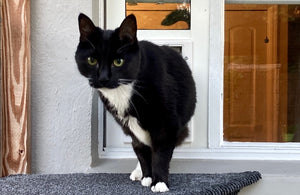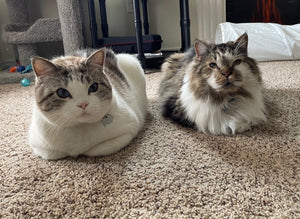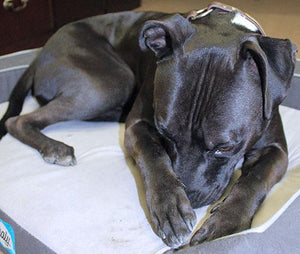IBD in Cats: What You Need to Know for Optimal Feline Health

If you're a cat owner, you may have heard of Inflammatory Bowel Disease, or IBD.
IBD is a condition that affects the digestive system and causes inflammation in the intestines. This inflammation can lead to a range of unpleasant symptoms for your cat, such as vomiting, diarrhea, weight loss, and lethargy.
While IBD has always been a concern for cat owners, it has become more common in recent years. Unfortunately, IBD in cats can be challenging to diagnose and manage, so it's important to be aware of the condition and its symptoms.
What Causes IBD In Cats?
There are several factors that can contribute to the development of IBD in cats, such as:
- Genetics, as certain breeds are more prone to the condition.
- Diet, as cats who are fed low-quality or inappropriate diets may be more likely to develop IBD.
- Stress, especially if they have a history of anxiety or if they experience changes in their environment.
However, it's important to note that the exact cause of IBD in cats is still unknown and may vary from cat to cat.
What Are the Symptoms Of IBD In Cats?
The symptoms of IBD in cats can vary, but some of the most common include vomiting, diarrhea, weight loss, and lethargy. These symptoms can also be caused by other health issues, so it's important to get a proper diagnosis from a veterinarian.
If your cat is showing any of these symptoms, it's best to make an appointment with your vet as soon as possible.
How Is IBD In Cats Diagnosed?
Diagnosing IBD in cats can be challenging, as the symptoms can be similar to other conditions.
Your veterinarian will likely start by performing a physical exam and taking a detailed medical history. They may also recommend blood tests, fecal exams, and imaging tests such as ultrasound or X-rays. In some cases, an endoscopy may be necessary to visualize the intestines and take a biopsy for a definitive diagnosis.

How Is IBD In Cats Treated?
Once your cat has been diagnosed with IBD, your veterinarian will work with you to develop a treatment plan.
There are several options for managing IBD in cats, including dietary changes, medication, and supplements. Your vet may recommend a prescription diet that is easier to digest and less likely to trigger inflammation. They may also prescribe medications such as steroids or immunosuppressants to help reduce inflammation. In some cases, probiotics or other supplements may be recommended to support digestive health.
It's important to work closely with your veterinarian to develop a treatment plan that is tailored to your cat's individual needs.
How Can I Prevent IBD In My Cat?
While IBD cannot always be prevented, there are steps you can take to reduce your cat's risk, such as:
- Feeding a high-quality diet that is appropriate for your cat's age and health needs
- Avoid feeding your cat low-quality or inappropriate diets, such as those that are high in carbohydrates or fillers.
- Reducing stress, especially if your cat is prone to anxiety.
- Providing a calm and consistent environment and ensuring that your cat has access to plenty of hiding places can help.
One of the best ways to reduce stress is to create an area of your house only your cat an enter, such as a catio or a blocked-off closet. By installing a cat door, you can ensure that only your cat has access to it, helping them to feel calmer.
Regular veterinary checkups are also key to catching any health issues early and preventing them from becoming more serious.
IBD in cats is a serious condition that can be challenging to manage. If you suspect that your cat may have IBD, it's important to seek veterinary care as soon as possible. With proper diagnosis and treatment, most cats with IBD can lead happy and healthy lives.





